Create luxurious musk-like scents at home with five natural alternatives: Ambrette seed CO2, dark patchouli, vetiver, myrrh, and agarwood (oud). You'll achieve the best results by blending these oils with jojoba or fractionated coconut oil as your carrier base. Start with small batches and allow your blends to mature in a cool, dark place. Understanding the unique properties of each substitute will help you craft the perfect signature scent.
Understanding What Makes a Great Musk Alternative
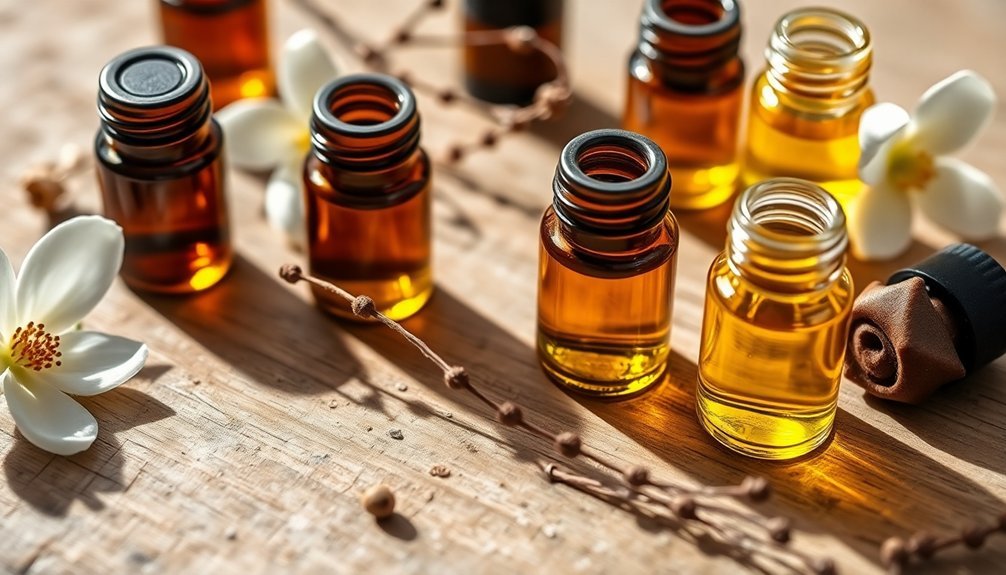
While natural musk has long been prized in perfumery, finding the right substitute requires understanding its essential characteristics.
You'll want to look for alternatives that capture musk's warm, rich profile with earthy undertones and skin-like qualities. The best substitutes offer deep, complex notes that can include hints of leather or tobacco.
A successful musk alternative should function as both a base note and fixative, helping to stabilize your fragrance while adding sensual depth. Jojoba oil serves as an excellent base carrier for musk substitutes due to its remarkable similarity to natural skin oils.
You can achieve these qualities through carefully selected ingredients like fossilized amber, vanilla, and essential oils such as patchouli and cedarwood.
The key is allowing your blend to mature properly in a cool, dark place, which helps the scent develop its full character and harmonize into a well-rounded fragrance.
Top Natural Essential Oils That Mimic Musk
Five essential oils stand out as premier natural alternatives to musk in perfumery.
You'll find Ambrette Seed CO2 leading the pack with its inherently musky profile, making it a go-to choice for natural perfumers.
Patchouli Premium Dark delivers an earthy depth that's remarkably similar to traditional musk, while Vetiver contributes deep, grounding notes that enhance the musky character of any blend.
For additional complexity, you can incorporate Myrrh, which offers a penetrating, earthy scent that closely resembles musk's intensity.
Agarwood (Oud) rounds out these options with its woody, slightly animalic notes that create an authentic musky impression.
Remember to dilute these oils properly with carrier oils like Jojoba before applying to skin, as they're highly concentrated in their pure form. Each drop of these carefully crafted musk-like oils contains pure essential oils ethically sourced and blended to perfection.
Creating Your Own Musk-Like Blends at Home
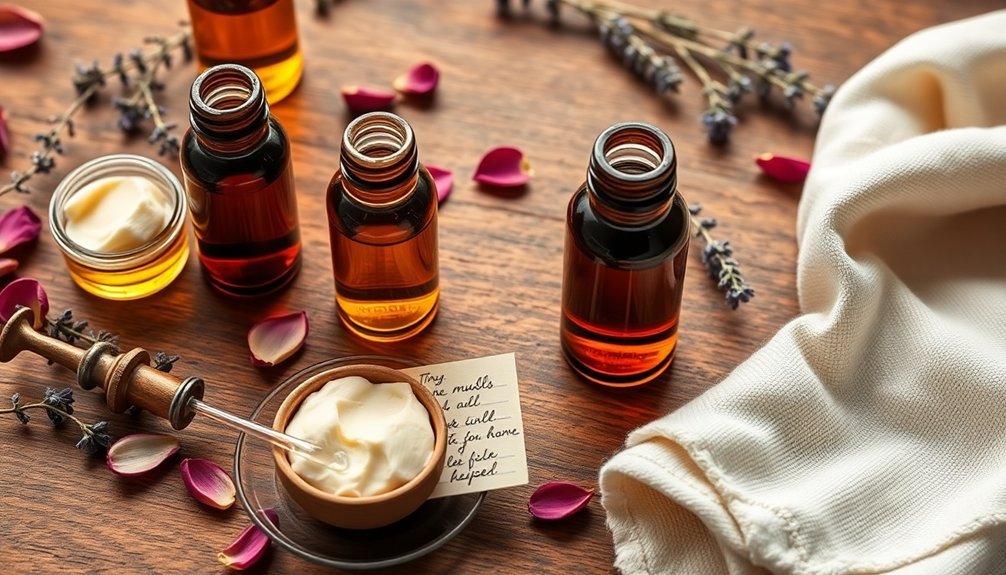
Creating your own musk-like fragrance blends at home requires understanding key principles of perfumery and essential oil combinations. Start by selecting oils from the oriental aroma family, combining them with woody notes like cedarwood and sandalwood.
You'll want to layer your scents carefully, beginning with base notes, then adding middle and top notes for complexity. Consider incorporating patchouli essential oil for its deep, earthy qualities. Always measure your ingredients precisely and start with small quantities.
Add natural fixatives like amber resin to stabilize your blend and extend its longevity. Let your creation mature in a dark, cool place for several weeks, shaking occasionally to guarantee proper mixing.
Store your final blend in an opaque bottle and document your recipe for future batches. With proper storage, your musk-like blend can last up to a year or longer.
Best Carrier Oils for Musk Alternative Blends
Selecting the right carrier oil serves as the foundation for any successful musk alternative blend. You'll find jojoba oil particularly effective due to its skin-like properties and ability to extend fragrance longevity.
For a lighter touch, fractionated coconut oil offers excellent absorption while keeping your blend pure and unscented.
If you're crafting warmer fragrances, sweet almond oil's subtle nutty undertones can enhance your musk alternatives, while grapeseed oil works beautifully with brighter scents.
For a luxurious finish, consider argan oil, especially when working with woody or exotic notes. Each carrier brings unique benefits – from jojoba's exceptional shelf life to argan's nourishing properties.
Choose based on your specific blend's characteristics and the final effect you're aiming to achieve.
Safety Guidelines When Working With Natural Musk Substitutes
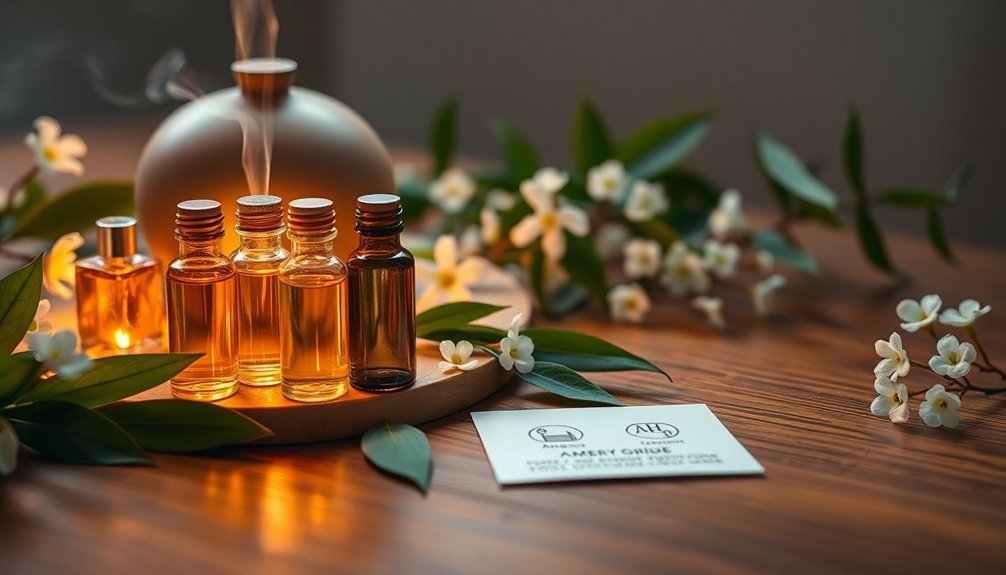
When working with natural musk substitutes, you must prioritize safety to prevent adverse skin reactions and environmental impacts. Always follow recommended concentration limits – stick to the EU's 0.5% or IFRA's 1.0% guidelines for substances like musk ambrette.
Test new blends on a small patch of skin first, as these materials can cause redness, itching, or allergic reactions.
Choose sustainable alternatives whenever possible, such as botanical musks from ambrette seed or angelica root. These options won't persist in the environment like synthetic musks do.
If you're using synthetic substitutes, guarantee proper disposal to prevent water and soil contamination. Keep your workspace well-ventilated, as some natural substitutes can trigger respiratory issues in sensitive individuals.
Always store your materials in sealed containers and follow manufacturer safety protocols.
Frequently Asked Questions
How Long Do Natural Musk Alternatives Typically Last on Skin?
You'll find that natural musk alternatives typically last up to 10 hours on your skin when properly applied. Using natural fixatives and applying to moisturized skin can help maximize their staying power.
Can Musk Substitutes Trigger Allergic Reactions in People Sensitive to Natural Musk?
Yes, you can experience allergic reactions to musk substitutes even if you're sensitive to natural musk. Both synthetic and natural alternatives may trigger skin irritation, rashes, or respiratory issues in sensitive individuals.
Are Natural Musk Alternatives Safe to Use During Pregnancy?
You should consult your healthcare provider before using natural musk alternatives during pregnancy. There's limited safety data, and these substances can accumulate in your body. It's best to exercise caution until medically cleared.
Do Musk Substitutes Interact Differently With Different Skin Chemistry Types?
Yes, your skin's pH and lipid composition will affect how musk substitutes interact. You'll notice different scent development and longevity based on your unique skin chemistry, especially between synthetic and natural musks.
Can Musk Alternatives Be Used in DIY Candle and Soap Making?
Yes, you can use musk alternatives in both DIY candles and soaps. They're stable, safe for skin contact, blend well with other fragrances, and maintain their scent effectively through heating and curing processes.
In Summary
You'll find that creating your own musk alternatives isn't just cost-effective – it's also a rewarding way to develop unique, personalized scents. With these five natural substitutes and proper blending techniques, you're well-equipped to craft beautiful fragrances at home. Remember to always follow safety guidelines, perform patch tests, and start with small batches as you explore the fascinating world of natural perfumery.
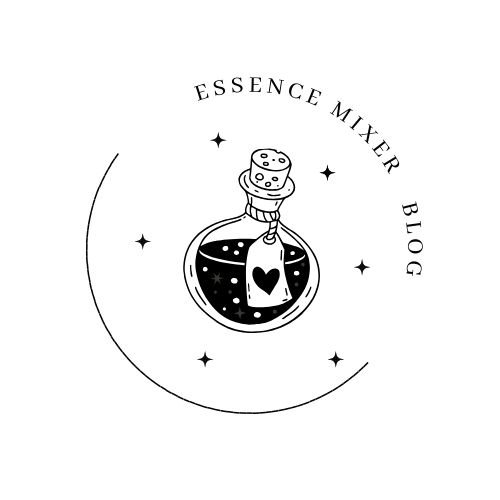
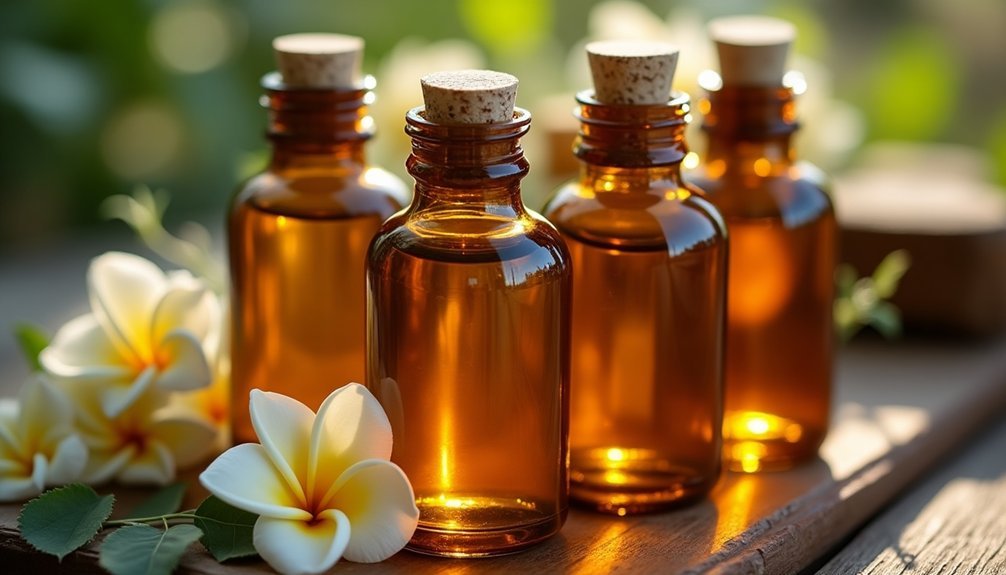



Leave a Reply